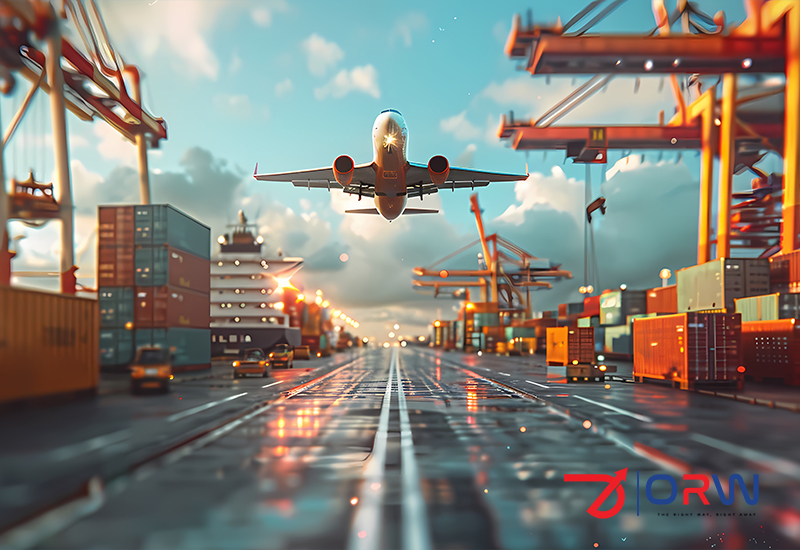Introduction
Hey there, logistics pros and business owners! Ever feel overwhelmed by shipping decisions? You’re not alone. In our fast-paced world, picking the right modes of transport can make or break your supply chain. At Okara Roadways, we know logistics companies in India inside out. Today, we’ll simplify the five main transportation types—road, rail, air, sea, and pipelines—and how they impact cost, speed, and reliability.
Whether you’re shipping widgets or wheat, understanding these methods of transportation is key to staying competitive. Let’s explore each type of transportation with its advantages and drawbacks in detail.
5 Modes of Transportation with Advantages & Disadvantages
Here’s a detailed transport types list, covering the five primary methods of transportation, along with their advantages and disadvantages.
1. Road Transport: Backbone of Domestic Logistics
Road transportation is the major and most common transportation of all; it’s basically delivering goods door-to-door through trucks. As India’s top road transport partner, Okara Roadways lives and breathes this transport type. It’s flexible, accessible, and perfect for short-to-medium hauls.
Advantages
- Door-to-Door Service: No transfers or delays. Your cargo goes straight from Point A to Point B.
- Flexibility: Detour around traffic? Change delivery windows? Done!
- Accessibility: Reaches villages, mountains, and everywhere in between.
- Budget-Friendly: For distances under 500 km, it’s the most cost-effective option.
Disadvantages
- Traffic Jams: Urban rush hour can delay schedules.
- Weather Woes: Monsoons or fog? Delays happen.
- Safety Risks: Higher accident rates than rail or air.
- Eco-Impact: Emissions contribute to pollution (but we’re fixing this—more later!).
2. Rail Transport: Efficient for Bulk and Long-Distance Hauls
Think coal, grain, or steel moving across states. Rail transport is the powerhouse for heavy, bulk cargo over long distances. While Okara Roadways specializes in roads, we respect rail’s role in the transport types list!
Advantages
- High Capacity: One train = hundreds of trucks! Ideal for massive shipments.
- Cost Savings: Cheaper per ton for goods like minerals or oil.
- Eco-Friendly: Trains emit 75% less CO₂ than trucks (source: ImexShipping).
- Safety First: Fewer accidents and theft risks.
Disadvantages
- Rigid Routes: Stuck to tracks? No detours!
- Last-Mile Hassles: Trains can’t reach factories—you’ll still need trucks.
- Slow Speeds: Not for urgent deliveries.
3. Air Transport: Fast and Reliable for Time-Sensitive Shipments
Need vaccines delivered globally in 48 hours? Air freight is your hero! This transport type is all about speed. Though we focus on roads, understanding the role of Air transportation modes and logistics helps you choose wisely.
Advantages
- Blazing Speed: Delhi to Dubai in hours, not weeks!
- Global Reach: Connects 100+ countries overnight.
- Premium Security: Low damage risk for electronics or luxury goods.
Disadvantages
- High Costs: Up to 5x pricier than sea freight.
- Weight Limits: Got a 10-ton machine? Ground it.
- Weather Turbulence: Storms cause costly delays.
4. Sea Transport: Ideal for International and Bulk Cargo
Imagine shipping 20,000 shoes from Mumbai to London. Sea freight handles the heavy lifting in global trade! It’s the slowest of the 5 modes of transportation, but unbeatable for bulk.
Advantages
- Massive Capacity: Ships carry skyscrapers’ worth of cargo!
- Cost-Effective: Lowest price per kg for transcontinental hauls.
- Fuel Efficient: Ships emit less CO₂ per ton than planes (Investopedia).
Disadvantages
- Snail’s Pace: Takes weeks (e.g., India to USA = 30+ days).
- Port Delays: Customs and congestion add headaches.
- Zero Inland Access: Ports only—trucks take over from there.
5. Pipeline Transport: The Silent Mover
Often overlooked, pipelines are vital for liquids and gases. While not Okara Roadways’ specialty, they’re key in the types of transportation spectrum—moving oil, water, or gas across continents.
Advantages
- 24/7 Flow: Non-stop movement with minimal human intervention.
- Low Costs: Cheap once the infrastructure is built.
- Eco-Safe: Zero transit emissions (leaks aside).
Disadvantages
- High Setup Cost: Billions needed for networks.
- Limited Use: Only liquids/gases—no gadgets or grain!
Why Choose Okara Roadways for Road Transportation?
Now that you’ve seen the types of transport, why pick Okara Roadways for your road logistics? Let’s see key points on how we turn road freight’s weaknesses into strengths:
Key Reasons
- Pan-India Network: From metro cities like delhi to mumbai transport services to remote towns in Assam.
- Tech-Powered Fleet: GPS-tracked trucks with real-time SMS updates.
- Expert Drivers: Trained in safety, efficiency, and customer care.
- Fair Pricing: No hidden fees—crystal-clear quotes.
- You First: Custom solutions for perishables, fragile items, or tight deadlines.
What the Future of Transportation in the Coming Years
The methods of transportation services are evolving fast! Think electric trucks (we’re adding 50+ to our fleet by 2026!), hydrogen trains, and AI-driven routes. At Okara Roadways, we’re investing in:
- Green Trucks: Reducing emissions by 40% by 2030.
- Automation: Smarter load-matching and delivery ETA apps.
- Multi-Modal Hubs: Combining road + rail for seamless long-haul.
Conclusion
So, how many types of transport rule logistics? Five core modes of transport—road, rail, air, sea, and pipelines—each with unique superpowers. Your choice depends on budget, urgency, and cargo transportation type.
At Okara Roadways, we’re masters of road transport, making it safer, greener, and more efficient. Ready to ship smarter? Partner with us for reliable, door-to-door solutions. Because in logistics, the right transportation mode logistics strategy isn’t just a choice—it’s your competitive edge.Got cargo to move? Contact Okara Roadways today—we’ll handle the rest.



